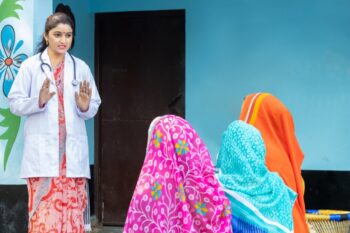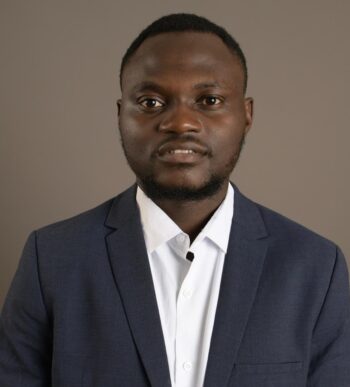Addressing Africa’s Healthcare Brain Drain: A Multisectoral Approach to Workforce Retention by Gabriel Oke
Why Focus on Decolonising Global Health in Workforce Retention?
 The migration of African healthcare professionals to developed countries is one of the most glaring examples of inequity in global health. With only 1.55 health workers per 1,000 people, Africa remains far below the WHO’s recommended ratio of 4.45 per 1,000 needed to deliver essential health services [1]. The migration of health professionals to the Global North is deeply rooted in colonial legacies, with power imbalances favoring richer nations that offer better career prospects, working conditions, and higher wages [2,3].
The migration of African healthcare professionals to developed countries is one of the most glaring examples of inequity in global health. With only 1.55 health workers per 1,000 people, Africa remains far below the WHO’s recommended ratio of 4.45 per 1,000 needed to deliver essential health services [1]. The migration of health professionals to the Global North is deeply rooted in colonial legacies, with power imbalances favoring richer nations that offer better career prospects, working conditions, and higher wages [2,3].
Addressing this crisis calls for a decolonial lens that interrogates the structural inequalities fueling the brain drain and challenges the systems that perpetuate it. As an advocate for global health equity, I conducted a targeted literature review during my Global Health Internship with Costello Medical. In this article, I will relate my findings to share some key strategies for retention that help to decolonise our approach to healthcare and provide a pathway to more sustainable, equitable solutions.
Decolonising Africa’s Healthcare Retention: A Multisectoral Approach
The issue of Africa’s healthcare brain drain is not simply a matter of individual choice. Limited professional development, poor working conditions, inadequate remuneration, and a lack of postgraduate training programs all contribute to the exodus of health professionals. These conditions reflect a broader pattern of historical extraction, where Africa continues to provide resources—both natural and human—that are used to bolster the development of wealthier nations.
A decolonial approach to this issue requires a comprehensive strategy that addresses these systemic inequities. Solutions must go beyond financial incentives, extending to mentorship programs, improved workplace environments, and equitable career development opportunities within local contexts. By investing in African healthcare professionals, strengthening local systems, and fostering genuine partnerships between nations, we can challenge the colonial patterns that drive healthcare migration.
Key Strategies for Retention
1. Localisation and Career Development
Decolonising workforce retention in Africa demands a focus on localised solutions that build capacity within health systems across the continent. Initiatives such as mentorship programs, postgraduate training, and tailored career progression pathways must be designed to address specific local needs and challenges. Regional collaborations like the College of Surgeons of East, Central, and Southern Africa (COSECSA) exemplify the power of locally-driven, high-quality training programs in retaining skilled professionals and strengthening health systems. COSECSA, non-profit making professional body, delivers a common surgical training programme with a common examination and an internationally recognized surgical qualification. The training programme is conducted within the trainee’s home country thorough an online platform. Studies have shown that training led and delivered locally enhances surgeon retention, with up to 95% of COSECSA graduates continuing to work in the region after completing their qualifications [4].
2. Financial and Professional Support
Healthcare workers often migrate in pursuit of better pay and professional growth. To address this, African governments and institutions must focus on closing wage gaps, improving working conditions, and offering incentives like housing, healthcare benefits, and opportunities for further education. These efforts must also take into account Africa’s broader socio-economic challenges, such as infrastructure deficits and governance issues, to ensure professionals can thrive within their home countries. The WHO’s Global Strategy on Human Resources for Health: Workforce 2030 (2016) outlined the need to adequately finance health systems and boost political will to mobilise resources needed to redress workforce gaps including provisions for competitive salaries and career advancement opportunities [5].
3. Ethical Partnerships and Global Accountability
International recruitment practices tend to favor wealthier nations, worsening the uneven distribution of healthcare workers. The WHO Global Code of Practice on the International Recruitment of Health Personnel [6] promotes ethical recruitment, urging destination countries to support the development of health systems in source countries. It also encourages countries to reduce their reliance on overseas workers while respecting the rights of healthcare professionals to migrate. Ensuring that partnerships between the Global North and the Global South are equitable is crucial, with a focus on strengthening African health systems rather than extracting talent. The IGHN Partnerships Programme is a model for the development of such high-quality equitable partnerships between health institutions in Ireland and in the Global South that through peer support and institutional development, strengthen health systems [7].
The Way Forward
Addressing the brain drain in Africa requires multisectoral action from governments, healthcare institutions, and international organisations. A decolonial approach challenges the exploitative dynamics that have long shaped global health and advocates for solutions that empower African nations to retain their talent and improve local health outcomes. By rethinking how we approach health worker migration through the lens of equity, localisation, and ethical practice, we can create a fairer, more resilient global health landscape.
Call to Action
Governments, healthcare institutions, and international organisations must work collaboratively to develop policies and strategies that prioritise healthcare workforce retention in Africa. This includes investing in local training, improving working conditions, and advocating for the implementation of the WHO’s Global Strategy on Human Resources for Health [5]. By taking these steps, we can not only address the brain drain but also advance toward a more equitable global health system that benefits all.
References:
[1] “Chronic staff shortfalls stifle Africa’s health systems: WHO study,” WHO | Regional Office for Africa, 2022. Accessed: October 25, 2024. [Online]. Available: https://www.afro.who.int/news/chronic-staff-shortfalls-stifle-africas-health-systems-who-study
[2] “Identifying Key Challenges Facing Healthcare Systems In Africa And Potential Solutions – PMC.” Accessed: October 25, 2024. [Online]. Available: https://www.ncbi.nlm.nih.gov/pmc/articles/PMC6844097/
[3] “The State of Health System(s) in Africa: Challenges and Opportunities – PMC.” Accessed: October 25, 2024. [Online]. Available: https://www.ncbi.nlm.nih.gov/pmc/articles/PMC7123888/
[4] College of Surgeons of East, Central and Southern Africa (COSECSA), n.d. Who We Are. Accessed October 25, 2025. [Online] Available: https://www.cosecsa.org/who-we-are/
[5] Global strategy on human resources for health: Workforce 2030 Accessed October 25, 2024.[Online] Available: https://www.who.int/publications/i/item/9789241511131
[6] WHO Global Code of Practice on the International Recruitment of Health Personnel. Accessed October 25, 2024.[Online] Available: https://www.who.int/publications/i/item/wha68.32
[7] IGHN Partnerships Programme. Accessed October 25, 2024. [Online] Available: https://globalhealth.ie/partnerships-programme/
About the Author
 Gabriel Oke holds a Master of Science in Global Health Delivery, specializing in Healthcare Management, from the University of Global Health Equity in Rwanda, and is currently pursuing an MSc in Medical Leadership at Lancaster University in the United Kingdom. With over six years of experience in global health, Gabriel has collaborated with leading organizations such as Nigeria Health Watch and the Foundation to Prevent Antimicrobial Resistance in Sweden. He has also consulted for Lifesten Health and led a feasibility study for Biospectal SA, evaluating the viability of the OptiBP mobile app for self-blood pressure monitoring. His internships with the Irish Global Health Network and Costello Medical, a global healthcare agency specializing in medical communication and health economics, have further honed his expertise. A publication from his research is currently under review for peer-reviewed publication. Gabriel specializes in health technology, health systems strengthening, combating antimicrobial resistance, and mental healthcare. He is deeply committed to decolonizing global health and enhancing the resilience of local health systems across Africa through research and effective health communication. www.linkedin.com/in/gabrieloke
Gabriel Oke holds a Master of Science in Global Health Delivery, specializing in Healthcare Management, from the University of Global Health Equity in Rwanda, and is currently pursuing an MSc in Medical Leadership at Lancaster University in the United Kingdom. With over six years of experience in global health, Gabriel has collaborated with leading organizations such as Nigeria Health Watch and the Foundation to Prevent Antimicrobial Resistance in Sweden. He has also consulted for Lifesten Health and led a feasibility study for Biospectal SA, evaluating the viability of the OptiBP mobile app for self-blood pressure monitoring. His internships with the Irish Global Health Network and Costello Medical, a global healthcare agency specializing in medical communication and health economics, have further honed his expertise. A publication from his research is currently under review for peer-reviewed publication. Gabriel specializes in health technology, health systems strengthening, combating antimicrobial resistance, and mental healthcare. He is deeply committed to decolonizing global health and enhancing the resilience of local health systems across Africa through research and effective health communication. www.linkedin.com/in/gabrieloke
CATEGORIES
- Restore Humanity Campaign
- Equity in Action Blog
- Training Programmes
- Sponsorship
- Vaccine Equity
- Get Global – Global Health Talks
- Student Outreach Team
- Get Global Young Professionals Talk Global Health
- Global Health Matters – Live Event Series
- Global Health Matters – IGHN Live Event Series
- An initiative of Irish Global Health Network
- ESTHER Ireland and ESTHER Alliance for Global Health Partnerships
- Global Health Matters – Webinar Series
- ESTHER
- IGHN Conferences
- Global Health Conference 2020
- Women in Global Health – Ireland Chapter
- ESTHER Partnerships
- Weekly Webinar Series
- 4th Global Forum on HRH
- Access to Medicines
- Archive Page Weekly COVID Webinars
- Clean Cooking 2019
- Climate Change and Health Conference 2017
- Conference Abstracts
- Conference Materials
- Covid FAQ
- COVID Funding Opportunities
- COVID-19
- COVID-19: Gender Resources
- Dashboard and online resources
- Education
- ESTHER Alliance
- Events
- Events & News
- Funding covid
- Global Health Exchange 2018
- Global Health Exchange 2019
- Global Health symposium 2019
- Health Workforce/HRH
- Homepage Featured
- Homepage recent posts
- IFGH 2011-2012 Conference and Events
- IFGH 2014 Conference
- IFGH Multimedia
- Irish AIDS Day 2017
- Irish News and Feeds
- Key Correspondent Articles
- Key Correspondent News
- Maternal Health
- Multimedia
- News
- News & Events
- Newsletter
- Opportunity
- Our LMIC's Resources for COVID19
- Partner Country News and Feeds
- Past Events
- Policy
- Presentations
- Recurring events
- Reports & Publications
- Research
- Resources
- Student Outreach Group
- Students Corner
- TEDTalks
- TRAINING COURSES FOR HEALTH CARE PROFESSIONALS
- Uncategorized
- Upcoming Events
RECENT POSTS

Impact testimonies- Lombani

Impact Testimony – Shadrick

Power, Inequality, Decolonisation – and Living My Recovery By Bronwyn April

Global Health Without Borders: Reflections on the Power of Diverse Voices

IGHNxEU – Empowering Women for a Healthier Europe

